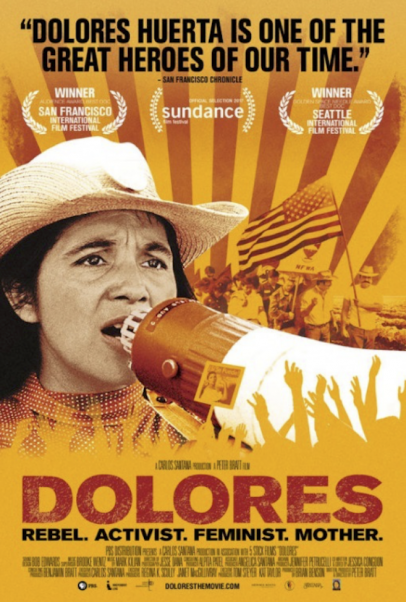Yes, Dolores Huerta Could— and She Hasn't Stopped
I learned about César Chávez in college. The charismatic, soft-spoken labor leader who fasted and organized farm workers to call for national boycotts and win them basic rights is memorialized around the country. I also remember when I started noticing mention of a United Farm Workers Union co-founder named Dolores Huerta and my feminist spidey senses heightened. Why wasn’t she talked about as much?
The documentary film Dolores aired on PBS this spring. It offers a window into the life of Huerta and, by proxy, into the evolving culture of racism, sexism and labor struggle in this country over a half century.
César and Dolores co-founded the United Farm Workers Union in 1962 and both poured everything they had into it for decades. Both had lots of children (César 8, Dolores 11) but it was Dolores who received criticism for prioritizing La Causa over her family. The film documents countless times when men, from her fellow UFW leaders to rival unions to politicians, deliberately tried to silence this fierce, articulate woman.
In addition to the dangerous front-lines work of striking and lobbying for better conditions for farm workers, Dolores also helped create basic functional institutions that helped with their daily needs: credit unions, legal services, voting rights and the like. Even the UFW’s famous rallying cry, “¡Sí se puede!” (Yes We Can!) is often falsely attributed to Chávez while it was Huerta who instigated it.
When César died unexpectedly in 1993, Dolores was passed over for the nomination to lead the union she had dedicated her life to, and at that point she decided to take a different course for her activism. Now in her 80s, she is working to empower young women of color to find their voices, take credit for their ideas and act on them.
The film is a window into a certain time and place in history, but it is also increasingly relevant as unions continue to lose strength and the rights of workers everywhere are eroding. Despite an ominously stacked deck and incomprehensible struggle, following a half century of Dolores’ irrepressible hope, courage and perseverance both humbles and empowers the viewer to speak out on behalf of the rights of farm workers to live with dignity, health and respect. One of the most dangerous consequences of our globalized food system is the subconscious or overt belief many eaters have that it is okay for some human beings to essentially use up their bodies so we can have cheap food. This film looks that underlying cultural narrative straight in the eye and demands that we can and should do more to change it.
César Chávez
United Farm Workers Union
Dolores Huerta
Dolores
La Causa









